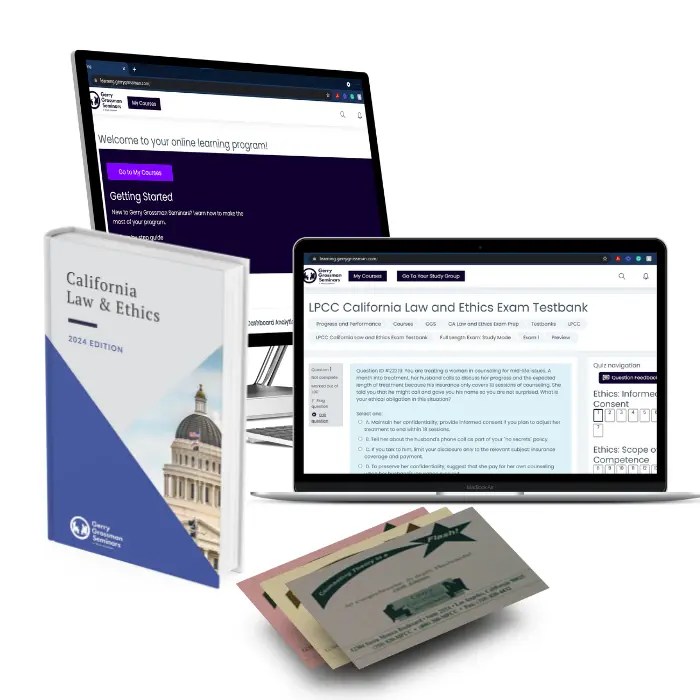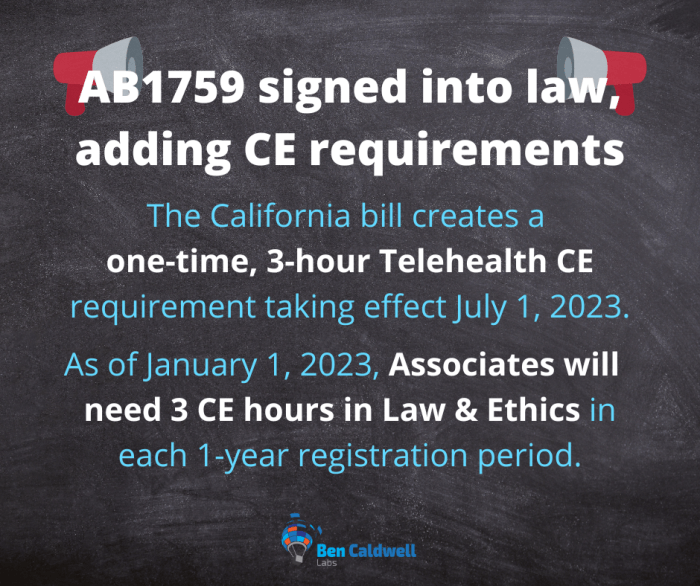Lpcc law and ethics exam prep – Embark on a journey of preparation for the LPCC Law and Ethics Exam with our captivating guide. We’ll delve into the intricacies of this crucial assessment, empowering you with the knowledge and strategies to conquer it.
Our comprehensive approach covers legal and ethical principles, ethical decision-making, specific legal and ethical issues, and essential resources to propel you towards success.
LPCC Law and Ethics Exam Prep Overview
The LPCC Law and Ethics Exam is a crucial step in obtaining licensure as a Licensed Professional Clinical Counselor (LPCC). It assesses candidates’ knowledge and understanding of legal and ethical principles governing the practice of counseling.
The exam consists of 100 multiple-choice questions covering various content areas, including:
- Legal and Ethical Principles
- Client Rights and Confidentiality
- Record Keeping and Documentation
- Professional Boundaries
li>Cultural Competence and Diversity
To pass the exam, candidates must achieve a minimum score of 70%. Adequate preparation is essential to ensure success on the exam.
Tips for Preparing for the Exam
- Study the Exam Content:Review the content areas covered on the exam and familiarize yourself with the legal and ethical principles.
- Utilize Study Materials:Utilize textbooks, online resources, and practice exams to enhance your understanding of the material.
- Practice Active Recall:Regularly test your knowledge by answering practice questions and explaining concepts to yourself.
- Join a Study Group:Collaborating with peers can provide support, motivation, and diverse perspectives.
- Seek Professional Guidance:Consider seeking guidance from an experienced LPCC or exam preparation course to clarify concepts and improve your chances of success.
Legal and Ethical Principles for LPCCs
Licensed Professional Clinical Counselors (LPCCs) are bound by a strict set of legal and ethical principles that guide their practice. These principles ensure that clients receive competent, ethical, and confidential care.
LPCCs must adhere to the ethical responsibilities Artikeld in their professional code of ethics, which includes maintaining confidentiality, obtaining informed consent, and avoiding dual relationships. Violating these ethical guidelines or practicing without a license can result in serious legal consequences.
Confidentiality
Confidentiality is a cornerstone of the therapeutic relationship. LPCCs are legally and ethically obligated to protect the privacy of their clients by keeping all communications and records confidential.
Exceptions to confidentiality exist in cases where there is a clear and imminent danger to the client or others, or when required by law.
Informed Consent
Informed consent is essential for ethical practice. LPCCs must obtain informed consent from clients before providing any treatment or services.
Informed consent involves providing clients with clear and accurate information about the nature of the services, the potential risks and benefits, and the client’s rights.
Dual Relationships
Dual relationships can occur when an LPCC has a personal, professional, or financial relationship with a client outside of the therapeutic context.
Dual relationships can compromise the objectivity and effectiveness of the therapeutic relationship and are generally prohibited by ethical guidelines.
Legal Implications of Practicing Without a License or Violating Ethical Guidelines
Practicing without a license or violating ethical guidelines can have serious legal consequences for LPCCs.
Unlicensed practice is a criminal offense in most states and can result in fines, imprisonment, and the inability to practice.
Violating ethical guidelines can lead to disciplinary action by the licensing board, including suspension or revocation of license.
The LPCC Law and Ethics Exam Prep can be a daunting task, but understanding the nuances of legal and ethical responsibilities is crucial. To delve deeper into these concepts, consider exploring the insightful chapter 11 just mercy summary . This resource provides valuable insights into the complexities of justice and ethics, enhancing your understanding for the LPCC Law and Ethics Exam Prep.
Ethical Decision-Making in LPCC Practice

Ethical decision-making is a crucial aspect of LPCC practice, guiding counselors in navigating complex ethical dilemmas and upholding their professional responsibilities. The ethical decision-making process involves a systematic approach to identify, analyze, and resolve ethical conflicts.
Ethical Decision-Making Process, Lpcc law and ethics exam prep
- Identify the Ethical Dilemma:Recognize the ethical issue(s) involved in the situation.
- Gather Information:Collect relevant facts and perspectives from all parties involved.
- Identify Ethical Principles and Values:Consider the applicable ethical principles and values that guide LPCC practice.
- Make a Decision:Choose the option that best aligns with ethical principles and values.
- Implement the Decision:Carry out the chosen course of action while maintaining ethical standards.
- Evaluate and Monitor:Reflect on the decision-making process and its outcomes to identify any areas for improvement.
li> Generate and Evaluate Options:Explore possible courses of action and assess their potential consequences.
Ethical Dilemmas for LPCCs
LPCCs may face a range of ethical dilemmas in their practice, including:
- Confidentiality vs. Duty to Warn:Balancing the client’s right to confidentiality with the ethical obligation to protect others from harm.
- Dual Relationships:Managing potential conflicts of interest when forming personal or business relationships with clients.
- Informed Consent:Ensuring that clients fully understand the nature and risks of treatment before providing services.
- Competence and Boundaries:Practicing within one’s scope of competence and maintaining appropriate professional boundaries with clients.
Strategies for Resolving Ethical Conflicts
To resolve ethical conflicts, LPCCs can employ various strategies:
- Consultation:Seek guidance from supervisors, colleagues, or ethics committees.
- Self-Reflection:Examine personal values and biases that may influence ethical decision-making.
- Ethical Codes and Guidelines:Refer to professional ethical codes and guidelines for guidance.
- Prioritize Client Well-being:Focus on promoting the client’s well-being and safety.
- Document Decision-Making:Keep a record of the ethical decision-making process for accountability and future reference.
Specific Legal and Ethical Issues for LPCCs

LPCCs must navigate various legal and ethical complexities specific to their practice. Understanding these issues is crucial for ensuring ethical and compliant counseling services.
Key legal and ethical considerations include record-keeping, informed consent, and confidentiality. LPCCs must maintain accurate and confidential client records to protect client privacy and ensure the integrity of services. Informed consent requires clients to fully understand the nature of counseling, its potential benefits and risks, and their rights before agreeing to treatment.
Working with Vulnerable Populations
Working with vulnerable populations, such as children or clients with disabilities, presents unique ethical challenges. LPCCs must be particularly mindful of power imbalances and the potential for exploitation. They must prioritize the well-being of these clients, ensure their safety, and respect their autonomy.
Resources for LPCC Law and Ethics Exam Prep
Preparing for the LPCC Law and Ethics Exam can be daunting, but there are numerous resources available to assist you in your preparation. These resources can help you gain a comprehensive understanding of the legal and ethical principles that govern LPCC practice and increase your chances of success on the exam.
Study Materials
* Textbooks and Workbooks:Several textbooks and workbooks specifically designed for LPCC Law and Ethics Exam preparation are available. These materials provide a structured overview of the relevant legal and ethical concepts and often include practice questions and sample exams.
Online Courses and Programs
Many online courses and programs offer comprehensive preparation for the LPCC Law and Ethics Exam. These courses typically cover the core legal and ethical principles, provide practice questions, and offer support from experienced instructors.
Study Groups
Joining a study group can be a valuable way to prepare for the exam. Study groups allow you to collaborate with other LPCCs, share knowledge, and quiz each other on key concepts.
Practice Exams
* Official Practice Exams:The licensing board that administers the LPCC Law and Ethics Exam may offer official practice exams. These exams provide an accurate representation of the actual exam and can help you identify areas where you need additional study.
Third-Party Practice Exams
Several third-party providers offer practice exams for the LPCC Law and Ethics Exam. These exams can be helpful for assessing your knowledge and practicing time management skills.
Professional Development Opportunities
* Workshops and Seminars:Attending workshops and seminars on LPCC law and ethics can provide valuable insights and help you stay up-to-date on the latest legal and ethical developments in the field.
Conferences
National and state LPCC conferences often include sessions on law and ethics. These sessions can provide an opportunity to learn from experts in the field and network with other LPCCs.
Professional Organizations and Mentorship
* Joining Professional Organizations:Professional organizations such as the American Counseling Association (ACA) and the National Board for Certified Counselors (NBCC) offer resources and support for LPCCs preparing for the Law and Ethics Exam. These organizations provide access to online forums, study materials, and mentorship programs.
Seeking Mentorship
Experienced LPCCs can provide invaluable guidance and support as you prepare for the exam. Consider reaching out to a mentor who can share their knowledge, offer practice questions, and provide encouragement.
Essential FAQs
What is the passing score for the LPCC Law and Ethics Exam?
The passing score may vary depending on the jurisdiction. Check with your licensing board for specific requirements.
Can I prepare for the exam independently?
Yes, it is possible to prepare independently using study materials, practice exams, and professional development resources.
What are the most common ethical dilemmas faced by LPCCs?
Common ethical dilemmas include conflicts of interest, confidentiality breaches, and balancing client autonomy with duty to protect.